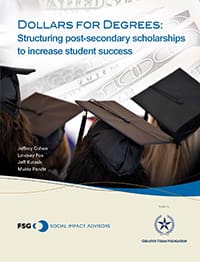While private, third-party scholarships account for a small portion of financial aid available to students nationally, they play a role far greater than their dollar amount might suggest. In order to ensure post-secondary persistence and completion as well as access, scholarship providers should offer non-financial support services to supplement financial aid. These services should be tailored to meet the needs of specific, higher-need demographic populations.
Top Takeaways
- Private, third-party scholarships are the most flexible type of funding; they fill gaps in funding from other sources and they reduce the debt burden students must assume, while enabling students to enroll full-time or work fewer hours while attending school.
- Examples of possible non-financial support services include pre-enrollment services (academic preparation, application assistance, and financial aid guidance) and post-enrollment services (academic, social, and financial supports, including emergency funding).
- Non-financial support services should be tailored to meet the needs of specific demographic populations. For example, for minority male students, services should be delivered proactively or be required; for community college students, additional resources should be provided for those who are working or who have families.

